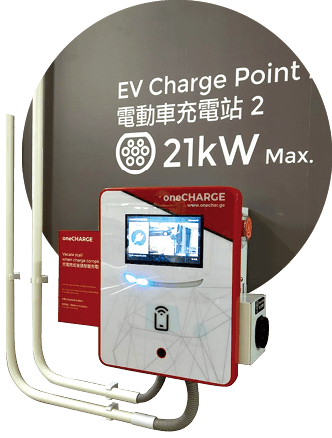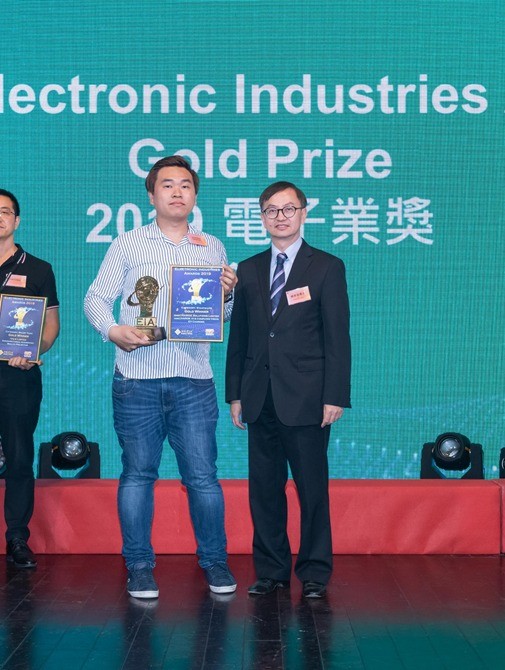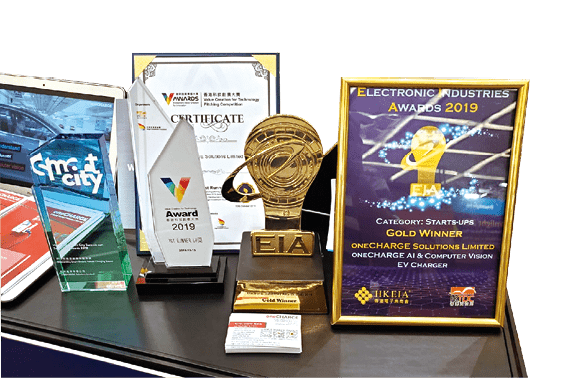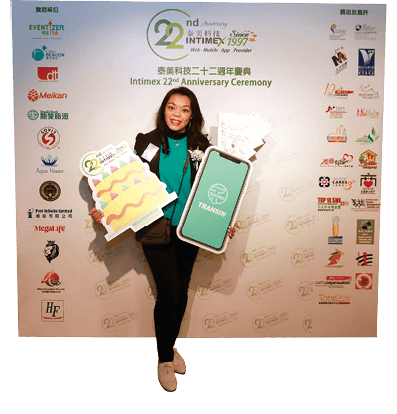
As an electric vehicle (EV) user, Cyrus had been troubled by charging problems for years. He points out that the relatively short driving distance within the city makes it suitable for the use of EV in Hong Kong, which also helps alleviate air and noise pollution, and enhance energy efficiency. 'It can be achieved as long as the charging facilities are fully equipped,' he stresses. Partnering with his friends, he turned his idea into innovative business solutions by setting up oneCHARGE Solutions Ltd. 'I didn’t think it would be successful when I first formed the start-up, but it was worth doing.'
Novel solution to EV charging problem
After two failed attempts, the team finally came off with an admission ticket to the Cyberport Incubation Programme, through which they received funding and venue support. The key of their successful bid is a self-developed system that combines charging facilities, applications and operating panels, which can be handled with just a smartphone. Cyrus supplements that the company has its own scientific research team to develop key technologies, saying, 'Foreign software doesn't suit our needs. We've spent several years perfecting the technology and tailor-made charging systems suitable for Hong Kong and other Asian countries.' The company's technology is in the forefront of the industry. For instance, the function to capture vehicle license plate information facilitates EV owners to directly connect to use the service. The payment system also allows users to pay after each transaction without pre-loading. While artificial intelligence technology and big data analytics are adopted to help manage traffic flow, network security is also addressed in addition to convenience and efficiency.

Exploring local and overseas markets
Start-up companies often encounter different problems such as shortage of funds, yet continuous product development is indispensable. After several years of hard work, Cyrus's team had set up 18 charging stations in Hong Kong by the end of 2020 and scooped multiple awards at home and abroad, including a Silver Award of the Hong Kong ICT Awards 2020 – Smart Mobility Award (Smart Transport). He pragmatically comments on the company's performance, 'We still need to work hard! The current number of charging stations is far from an impressive transcript.' Over the past two years, the epidemic has reduced the flow of people and vehicles in shopping malls, affecting their business, but he is pleased to share that new orders have been signed and a considerable number of charging stations will be set up.
'Hong Kong is a small city and to tap into overseas markets is a necessary step in our development. We therefore need to maintain a high level of innovativeness and scientific research output,' he continues. In 2018, the company participated in a start-up accelerator programme organized by the South Korean government and got the chance to enter its local market. The following year, their solution bagged a Creative Award in the Busan Startup Week. Though in the early stage of development, the company has already set up charging stations in South Korea.
To avoid wasting time in quarantine, Cyrus is currently living in South Korea and suffering from frigid temperatures even before winter has arrived. The out-of-towner only knows a little Korean but in order to expand his business, he deals with everything calmly. 'Whether it is technology or user feedback, I will bring all my experience gained from overseas markets back to Hong Kong to help promote our business,' he affirms. Indeed their charging stations have already been set up in Shenzhen and Shanghai.

Breaking barriers to create synergy
Cyrus admits that competition in the local market is relatively fierce, but he believes the operational mode with clear barriers between competitors is outdated. 'We can compete with one another in technology,' he reckons, 'but in terms of operation, we should promote synergy and make up for service deficiencies, such as the arrangement and use of charging stations, to facilitate EV owners.' As observed from various cases in different places, the more information can be exchanged, the faster the business of various stakeholders will develop. 'This is indispensable for building a smart city.'
As a Hospitality Management graduate in 2011, Cyrus sincerely appreciates that his degree qualifications made him eligible to participate in South Korea's start-up programme. The business management knowledge he learned from the University has also helped him embark on a business venture. 'Basic skills are very important, which may help you reduce abortive work,' he reminds fellow young people who also wish to start a business. He also recommends them to take entrepreneurship courses and enrich work experience, while at the same time be psychologically prepared for failure. After all, we can learn from it and prepare ourselves to face the next challenge. 'Through trial and error!' he emphasizes. 'Try a few more times to find out whether your idea is feasible, and then gradually optimize it to succeed.'






 Daisy, CEO of Intimex Business Solutions Co., Ltd, has engaged in e-commerce for many years. Constantly keeping herself abreast of technology trends and rapid changes in the market, she leads her team to develop new systems and expand business opportunities. In 2017, she launched the intelligent savings platform Transin, where users receive cashback upon uploading a consumption receipt. The app also helps them sort out their consumption habits through big data analysis. 'We encourage the young generation to live within their means,' she elaborates. 'By accumulating their savings, they may gradually be able to realize their dreams.' The platform also analyses the overall market trend for merchants. To date, it has received support from more than 150 merchants and has collected over 230,000 receipts, with a total consumption amount exceeding HK$ 40 million. The solution scooped the Gold award in the Wealth Management Tech category of the 2020 IFTA FinTech Achievement Awards. 'On average, the platform receives receipts uploaded by users every minute,' she says with joy. 'The results far exceeded our expectations!'
Daisy, CEO of Intimex Business Solutions Co., Ltd, has engaged in e-commerce for many years. Constantly keeping herself abreast of technology trends and rapid changes in the market, she leads her team to develop new systems and expand business opportunities. In 2017, she launched the intelligent savings platform Transin, where users receive cashback upon uploading a consumption receipt. The app also helps them sort out their consumption habits through big data analysis. 'We encourage the young generation to live within their means,' she elaborates. 'By accumulating their savings, they may gradually be able to realize their dreams.' The platform also analyses the overall market trend for merchants. To date, it has received support from more than 150 merchants and has collected over 230,000 receipts, with a total consumption amount exceeding HK$ 40 million. The solution scooped the Gold award in the Wealth Management Tech category of the 2020 IFTA FinTech Achievement Awards. 'On average, the platform receives receipts uploaded by users every minute,' she says with joy. 'The results far exceeded our expectations!'













